Cremation, Caste, and Cosmogony in Karmic Traditions.
Cremation, Caste, and Cosmogony in Karmic Traditions.
Cremation, Caste, and Cosmogony in Karmic Traditions.
You also want an ePaper? Increase the reach of your titles
YUMPU automatically turns print PDFs into web optimized ePapers that Google loves.
soteriologcial welfare of the group, then one cannot<br />
expect Empedoclean rebirth to be concerned with<br />
ethicization” (ibid:231) s<strong>in</strong>ce this thought, together with<br />
the earlier Pythagorean <strong>and</strong> later Platonian (which I will<br />
return to), were partly esoteric <strong>and</strong> highly elitistic. These<br />
th<strong>in</strong>kers were <strong>in</strong>dividualists <strong>in</strong>terested <strong>in</strong> personal<br />
salvation rather than convert<strong>in</strong>g the Greek population<br />
<strong>in</strong>to their beliefs. Thus, to sum up: Pythagorianism<br />
postulated a cyclical theory of rebirth where the soul is<br />
reborn on earth without an <strong>in</strong>termediate sojourn <strong>in</strong> a<br />
heaven or hell, which means that it did not <strong>in</strong>corporate<br />
much of ma<strong>in</strong>l<strong>and</strong> religious ideas of Hades etc, “lend<strong>in</strong>g<br />
plausibility to the view that their rebirth theories came<br />
from the “outside” <strong>and</strong> were given special eschatological<br />
development <strong>and</strong> mean<strong>in</strong>g by Pythagoras” (ibid:233).<br />
From Plato to Plot<strong>in</strong>us<br />
If we have lived former lives, why can we not remember<br />
anyth<strong>in</strong>g from these lives? The River Lethe was the<br />
solution to this problem, <strong>and</strong> was <strong>in</strong>troduced <strong>in</strong> the fifth<br />
century BCE. However, this does not mean that the<br />
River Lethe first appeared <strong>in</strong> Greek religion as an<br />
answer to objections to ideas of re<strong>in</strong>carnation (Whittaker<br />
1954:55). In Whittaker’s discussion of whether or not<br />
Empedocles <strong>in</strong> his system of re<strong>in</strong>carnation depended<br />
upon earlier writers, he uses Plato’s concept of the River<br />
Lethe <strong>in</strong> the Myth Er <strong>in</strong> Book X of the Republic argu<strong>in</strong>g<br />
that the ideas of this river are <strong>in</strong>compatible with the form<br />
of the doctr<strong>in</strong>e of re<strong>in</strong>carnation held by Empedocles.<br />
Therefore, Whittaker argues that it is unlikely that the<br />
idea of Lethe – the river which washes away men’s<br />
remembrance on their stay <strong>in</strong> Hades – appeared until late<br />
<strong>in</strong> the fifth century. Thus, Empedocles developed his<br />
ideas <strong>in</strong> a period before the concept of the cleans<strong>in</strong>g<br />
River Lethe was <strong>in</strong>vented (ibid:54). Even though the<br />
notion of Lethe might be very old, the appearance of the<br />
actual river <strong>in</strong> the Underworld cannot be dated much<br />
before the beg<strong>in</strong>n<strong>in</strong>g of the fourth century (ibid:56).<br />
There are no concepts of an Underworld <strong>in</strong> the<br />
Empedocles’s system of re<strong>in</strong>carnation (ibid:84). “Plato,<br />
one would imag<strong>in</strong>e, took over the doctr<strong>in</strong>e of Lethe as<br />
the river which washed away men’s recollection of their<br />
previous existence <strong>and</strong> of their abode <strong>in</strong> Hades. Plato<br />
<strong>in</strong>troduces the idea that the effect of the water varies<br />
accord<strong>in</strong>g to the amount of it that one dr<strong>in</strong>ks. The force<br />
of the Republic passage is much lessened if one suppose<br />
that the whole idea of Lethe wash<strong>in</strong>g away remembrance<br />
was Plato’s own <strong>in</strong>vention” (ibid:58).<br />
Hence, Plato’s rebirth theory has to be seen as a result of<br />
Plato himself “be<strong>in</strong>g trapped <strong>in</strong> the prison of the preexist<strong>in</strong>g<br />
tradition” (Obeyesekere 2002:274). Plato<br />
<strong>in</strong>herited an ethicised Hell <strong>and</strong> Heaven from P<strong>in</strong>dar <strong>and</strong><br />
probably Orphic thought (ibid). In Republic X Plato<br />
writes regard<strong>in</strong>g the deceased’s soul that:<br />
“…Next it went, without turn<strong>in</strong>g around, beneath the<br />
throne of Necessity, <strong>and</strong> after pass<strong>in</strong>g through it, when<br />
229<br />
the others too came through, all went on their way<br />
towards the plane of Forgett<strong>in</strong>g, through a hot <strong>and</strong><br />
fiercely suffocat<strong>in</strong>g atmosphere (for the place was bare<br />
of trees <strong>and</strong> all plant life). They camped, when even<strong>in</strong>g<br />
was com<strong>in</strong>g on, by the river Heedless, whose water no<br />
vessel can conta<strong>in</strong>. Now, it was obligatory for all to<br />
dr<strong>in</strong>k a certa<strong>in</strong> quantity of water, but those lack<strong>in</strong>g <strong>in</strong><br />
sense drank more than this measure. And after<br />
dr<strong>in</strong>k<strong>in</strong>g from it, a person began to forget everyth<strong>in</strong>g.<br />
When they were asleep <strong>and</strong> midnight came, there<br />
occurred thunder <strong>and</strong> an earthquake, <strong>and</strong> after that<br />
they were immediately carried up <strong>in</strong> different<br />
directions to their moment of birth, shoot<strong>in</strong>g like stars.<br />
Er himself was prevented from dr<strong>in</strong>k<strong>in</strong>g the water;<br />
even so, he did not know where or how he reentered<br />
his body, but he suddenly opened his eyes <strong>and</strong> saw<br />
himself ly<strong>in</strong>g on the pyre at dawn” (op.cit . Halliwell<br />
1988:103).<br />
Follow<strong>in</strong>g Obeyesekere, Plato’s rebirth theory stops at<br />
step 1 of ethicisation with one exception. In Timaeus<br />
there is a reference that those who were immortal, folly,<br />
<strong>and</strong> cowardice <strong>in</strong> the orig<strong>in</strong>al community of men were<br />
reborn as women, birds, <strong>in</strong>sects, animals, reptiles, <strong>and</strong><br />
fish. These rebirths seem to bear close resemblances to<br />
ethicisation step 2, but this is not so, because Timaeus is<br />
the charter-myth, which describes how women <strong>and</strong> other<br />
creatures orig<strong>in</strong>ated. Be<strong>in</strong>g human was be<strong>in</strong>g a man, not<br />
a woman.<br />
Thus, there is a chronology <strong>in</strong> Plato’s rebirths. The first<br />
<strong>in</strong>carnation or the orig<strong>in</strong>al creation consisted only of<br />
men created by the gods. The second <strong>in</strong>carnation or first<br />
re<strong>in</strong>carnation <strong>in</strong>volved the process similar to ethicisation<br />
step 2 <strong>in</strong> which all other be<strong>in</strong>gs <strong>and</strong> creatures, <strong>in</strong>clud<strong>in</strong>g<br />
women, are born as a consequence of humans’, mean<strong>in</strong>g<br />
men’s, misconduct. The second re<strong>in</strong>carnation <strong>in</strong>volves<br />
only ethicisation step 1 <strong>in</strong> which men, women, animals,<br />
fish, <strong>and</strong> plants are judged <strong>and</strong> sent to either Heaven or<br />
Hades. After the otherworldly rewards or punishments a<br />
human (or creature) is reborn. Accord<strong>in</strong>g to Plato, this<br />
happens <strong>in</strong> accordance with “free will”: each persona<br />
can choose what one would like to become <strong>in</strong> the next<br />
<strong>in</strong>carnation. Each “stage” which <strong>in</strong>cludes a worldly life<br />
<strong>and</strong> a stay <strong>in</strong> Heaven or Hades lasts for a thous<strong>and</strong> year,<br />
<strong>and</strong> each persona will be <strong>in</strong>carnated ten times, which<br />
means that the cycle of rebirth lasts for ten thous<strong>and</strong><br />
years (Obeyesekere 2002:271-273). The reason why<br />
each person can choose its next <strong>in</strong>carnation is a result of<br />
ethicisation step 1. “If people are punished <strong>and</strong> rewarded<br />
<strong>in</strong> the other world for what they have done on earth, then<br />
each person’s slate has been wiped clean so there is no<br />
need for rewards <strong>and</strong> punishments <strong>in</strong> the next human<br />
rebirth” (ibid:246), which is a dilemma ignored for<br />
<strong>in</strong>stance <strong>in</strong> Buddhism’s ethicisation step 2. Therefore, a<br />
karma theory cannot evolve with<strong>in</strong> Plato because “those<br />
who are seek<strong>in</strong>g rebirth have fully expended their load<br />
of s<strong>in</strong> <strong>and</strong> merit, they are now given the freedom to<br />
choose what they want to be <strong>in</strong> their next <strong>in</strong>carnation”<br />
(ibid:246-247). Philosophers who wisely pick their lot<br />
<strong>and</strong> choose to be reborn three times as philosophers will<br />
be released from the cycle of rebirths (ibid:271), but <strong>in</strong>


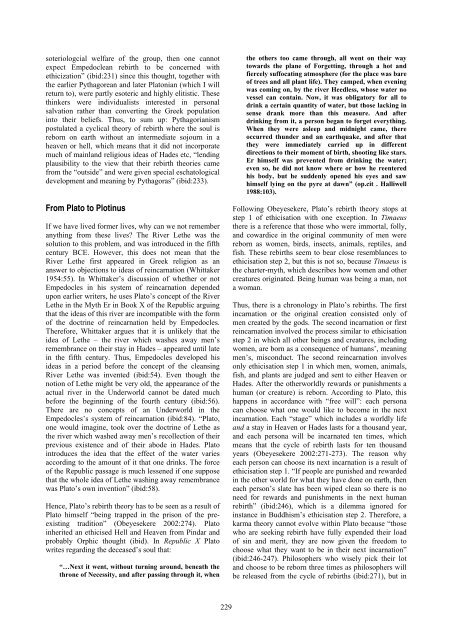
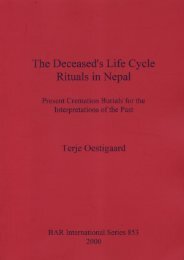


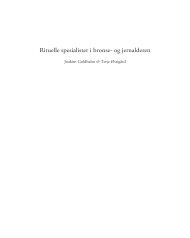
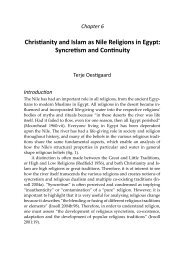
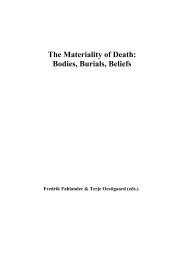


![Fullmono-AK [P2118].indd - oestigaard](https://img.yumpu.com/18994998/1/177x260/fullmono-ak-p2118indd-oestigaard.jpg?quality=85)